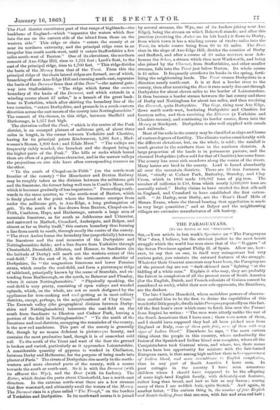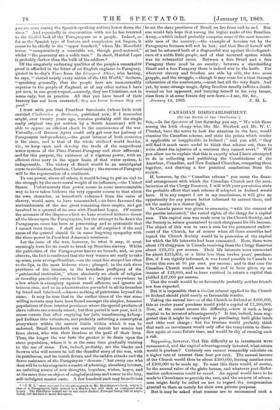THE PARAGUAYANS. [To THE EDITOR OF THE " SPECTATOR:I Shy—Your
article in last week's Spectator on "The Paraguayan War" does, I believe, but the strictest justice to the most heroic struggle which the world has seen since that of the " Beggars" of the Seven Provinces against Philip II. of Spain. Allow we, however, to say that on one, in itself very unimportant but very curious point, you misstate the outward features of the struggle. Whatever their Guarani ancestors may have been, the Paraguayans
of the present day are not "dark-skinned men" fighting "at the bidding of a white man." Explain it who may, they are probably the fairest in complexion of all the present races of South America (for the English, Dutch, and French colonists of Guiana cannot be considered as such), whilst their now sole opponents, the Brazilians, are the darkest.
The late Charles Mansfield, whose matchless powers of observation enabled him to be the first to divine the capabilities of this wonderful little people, dwells in his Paraguay repeatedlyea this fact. Of the first boat's crew which came to fetch hint over the Parana from Itapirti he writes : "The men were utterly unlike the rest. of the South Americans that I have seen ; there were seven of them, and I should have supposed they had all been picked men from England or Italy, some of them quite fair, now of them with any signs of Indian blood." Elsewhere he says, "The most curious thing about the people in this country, where undoubtedly the fusion of the Spanish and Indian blood was complete, where all the Conquistadores took Guarani wives, and where, too, there seems to have been leas opportunity for mixture with the fair-haired European races, is that among high and low there is less appearance of Indian blood, and more resemblance 11 English complexion, than in any part of South America I have seen. In poor cottages in the country I have seen numerous children whom I should have supposed to be the offspring of some high-bred English family, with delicately-cut features, rather long than broad, and hair as fair as any Saxon ; among many of them I see reddish hair, quite Scotch." Aud again, in another letter, "The curious thing is, the number of/air English and Scotch-looking faces that one sees, with fair and even red hair ;
you see none among the Spanish-speaking natives lower down the river." And repeatedly in conversation with me he has reverted to the English look of the Paraguayans as a people. Indeed, so far as the Spanish type of feature and complexion yet lingers, it seems to be chiefly in the "upper hundred," whom Mr. Mansfield terms "comparatively a miserable set, though good-natured," whilst "the peasantry are a noble race." In short, Marshal Lopez is probably darker than the bulk of his soldiers.* Of the singularly endearing qualities of the people a remarkable proof is afforded in the letter of an English engineer in Paraguay, quoted in to-day's Times from the Liverpool Albion, who having, he says, "visited nearly every nation of the Old World," declares, "speaking generally, that the people here are immeasurably superior to the people of England, or of any other nation I have yet seen, in one great respect,—namely, they are Christians, not in name only, but in practice. All that you have heard of their bravery has not been overrated; they are brave because they are good."
I trust with you that President Sariniento (whose little work entitled Civilisacion y Barbcerie, published now, if I remember aright, over twenty years ago, remains probably still the single really original one yet written by a South American) will be able to oppose an efficient check to the continuance of the war. Virtually,—if Buenos Ayres could only get over her jealousy of Paraguayan independence,—the great interest of both countries is the same, and is that of the whole civilized world besides, viz., to keep open and develop the trade of the magnificent water system of the Plate-Parana-Paraguay and their affluents ; and for this purpose, the existence of a vigorous power, with an efficient river navy in the upper basin of that water system, is indispensable. The victory of Brazil would be an unmitigated curse to civilization, freedom, Christianity ; the success of Paraguay will be the regeneration of a continent.
To one power, above all others, it would belong to put an end to the struggle by the mere moral weight of its influence,—the United States. Unfortunately that power seems in some unaccountable way to have taken hitherto the very opposite course to that which its own character, as henceforth redeemed from the curse of slavery, would seem to have comnaanded,—to have favoured the encroachments of the one great remaining slave empire, and got involved in a quarrel of its own with President Lopez. Of course the accounts of the disputes which we have received hitherto throw all the blame upon the Paraguayans, but the attempt to lie down the Paraguayan cause has been so persevering and so systematic that I cannot trust them. I shall not be at all surprised if the real cause of the quarrel should lie in some lingering sympathy with the slave-power in President Johnson's nominees.
Let the issue of the war, however, be what it may, it must seemingly have for its result to break up Brazilian slavery. Whilst the patriotism of the Paraguayans knows no bounds, and, as you observe, the fact is confirmed that the very women are ready to take up arms, your average Brazilian, —on the coast line steeped too often to the lips, in the most hideous vices ; plunged, in the rich slave provinces of the interior, in the boundless profligacy of the "patriarchal institution," where absolutely no check of religion or morality practically exists to limit it ; subject everywhere to a law which is exemplary against small offences, and ignores all heinous ones, and to an administration pervaded in all its branches by fraud and falsehood,—knows nothing of patriotism beyond the name. It may be true that in the earlier times of the war some willing recruits may have been found amongst the simpler, honester populations of those interior provinces where the special products of slave culture are scarcely raised ; but that period is now past, and it seems certain that after emptying her jails, transforming kidnapped Indians into volunteers, and probably enforcing a conscription everywhere within the narrow limits within which it can be enforced, Brazil henceforth can scarcely recruit her armies but from slaves, who win their freedom at the peril of their lives. Thus, the longer the war lasts the greater is its drain upon the slave population, whom it is at the same time gradually training to the use of arms. Few, indeed, probably, are the blacks and browns who will return US tell the dreadful story of the war, with its pestilences, and its marsh fevers, and the sudden attacks and the fierce resistance of the Paraguayan "demons ;" but every one who does will be to his congeners a centre of admiring, absorbing interest, an unfailing source of new thoughts, impulses, wishes, hopes, and at the same time an object of mingled jealousy and terror to the lazy, self-indulgent master caste. A few hundred such may be sufficient to set the slave provinces of Brazil on fire from end to end. But one would fain hope that among the higher ranks of the Brazilian Army,—which indeed probably comprise some of the most honourable men of the country,—the example of heroism set by the Paraguayan freemen will not be lost ; and that Brazil herself will at last be ashamed both of a disgraceful war against the independence of a noble little people, and of that accursed system which was its substantial cause. Between a free Brazil and a free Paraguay there need be no enmity ; between a slaveholding Brazil and a free Paraguay there is indeed war to the knife. For wherever slavery and freedom are side by side, the two must grapple, and the struggle,—though it may cease for a time through exhaustion of the combatants,—must last till the very death. And yet, by some strange magic, dying freedom usually inflicts a deathwound on her opponent, and burying herself in his very breast, rises from it at some future day new-born.—I am, Sir, &c.,
January 12, 1869. J. M. L.































 Previous page
Previous page